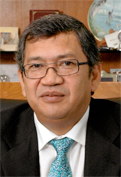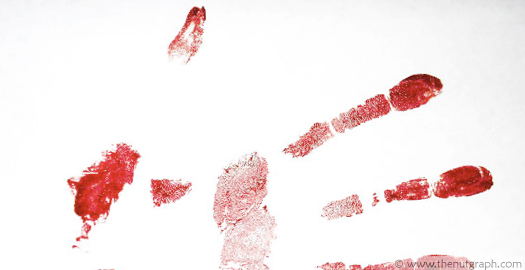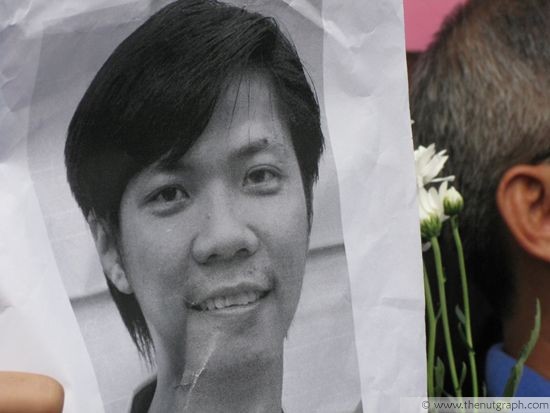MANY questions have arisen from the sudden introduction in the inquest into Teoh Beng Hock‘s death of a note purportedly found in the DAP aide’s bag. More than a year after the inquest started, the Attorney-General (AG)’s Chambers surprised the coroner’s court on 9 Aug 2010, saying it wanted to introduce the note which “may throw some light on [Teoh’s] death”.

In a press statement, the AG’s Chambers said the note first came to their attention on 7 Oct 2009, more than two months after Teoh‘s death. It said that due to the AG being suspicious about its authenticity, the note was not disclosed or tendered in the inquest. However, due to a “recent” admission by investigating police officer Ahmad Nazri Zainal that he actually found the note on 17 July 2009 but did not realise its significance, the AG decided to now tender the note as evidence.
Public incredulity at this turn of events was only to be expected especially since Teoh’s mysterious death, after being interrogated by a government agency, has generated widespread public interest. But can the AG’s Chambers legally introduce the note at this late stage in the inquest? Can the court reject the note considering the questions surrounding its sudden emergence?
And what does this incident reveal about the conduct of the AG’s Chambers? Can they be entrusted with carrying out inquests and criminal prosecutions fairly and openly?
Finding the truth
Criminal lawyer Datuk Baljit Singh Sidhu says the AG’s Chambers is allowed to introduce the note, even at this late stage. “The magistrate cannot disregard the evidence. He [or she] must examine all evidence which could have led to the death,” Baljit says in a phone interview.

According to Practice Direction No 1 of 2007 which sets out inquest guidelines, an inquest is not like a criminal trial, which is adversarial in nature. The prosecution in an inquest is there merely to assist with the examination of witnesses to help the magistrate ascertain the cause of death and whether any specific persons were involved. The magistrate also need not strictly follow the usual evidence rules but may use his or her discretion.
Baljit however says the magistrate still needs to allow interested parties to have the document examined by experts and to recall witnesses to deal with possible new lines of questioning. “Everything must be done in the interest of justice to ascertain the cause of [Teoh’s] death,” he stresses.
But what can we make of the extremely late disclosure of this potentially crucial piece of evidence? “I’m speechless,” Baljit says. “One moment the AG’s Chambers say they want to be transparent and fair in all proceedings, the next, this happens.”
Playing fair

Playing fairly and openly however has not always been the prosecution’s forte, not just during inquests, but also in criminal proceedings. This is hardly the first time the prosecution has delayed disclosure of documents to interested parties.
This is despite the fact that under a 2006 amendment to the Criminal Procedure Code (CPC), the prosecution is now obliged to disclose to the defence all the evidence they intend to tender before the trial begins. But what happens if the prosecution fails to do so? Are there sanctions imposed on the prosecution? Can the evidence be disregarded?
Baljit says no. “The courts have been saying [the requirement under section 51A to disclose all the evidence that will be tendered before trial] is only directory, not mandatory. If the evidence is not produced within the time stipulated, it’s not fatal.”

But aren’t the requirements supposed to be mandatory? After all, Section 51A states, “The prosecution shall before the commencement of the trial deliver to the accused the following documents.” Otherwise, what would be the point of amending the law if it was only meant to be a directive?
The CPC amendments also require the prosecution to produce a “written statement of facts favourable to the defence.”
“Yes, they do sometimes give us the statement,” says lawyer Richard Wee in a phone interview. “But all the statement says is, ‘There are no facts favourable to the defence’. But my clients still get acquitted so there must have been some facts in our favour otherwise how were they found not guilty?”
“I demand to see my lawyer”
 Wee adds that CPC requirements giving arrested persons the right to see their lawyers are also frequently not complied with. “The police just don’t respect it,” he says. “They do allow us to see our clients sometimes, but it’s often done grudgingly and with limits. It feels like we’re asking for favours to see our clients.”
Wee adds that CPC requirements giving arrested persons the right to see their lawyers are also frequently not complied with. “The police just don’t respect it,” he says. “They do allow us to see our clients sometimes, but it’s often done grudgingly and with limits. It feels like we’re asking for favours to see our clients.”
“The prosecution’s job is to uphold justice in the public interest,” notes Baljit. “They should not be overzealous. It’s prosecution, not persecution.”
Winning on merit
The objective of the CPC amendments was to provide balance to the prosecution and defence. Crucial evidence should not be hidden from the defence, or in the case of an inquest, interested parties. After all, isn’t the purpose of such proceedings to establish the truth and dispense justice?
The prosecution should not have to rely on underhanded tactics and “cat and mouse games” to successfully secure a conviction. In an ideal world, the investigation of an offence should be so thorough that even if all the available evidence were revealed to the defence, the prosecution would still be able to prove beyond reasonable doubt that the accused was guilty.
Our law can probably still be amended further to make the balance between the prosecution and defence more equal. But if the police and prosecution could just start by complying with the spirit of the 2006 amendments, it would already create a more equitable situation.
It is not just the final verdict or outcome in a court case that is important. It is also the manner in which that conclusion was reached that determines whether or not the public have confidence in that verdict. The justice system can only gain credibility if its actors are transparent, open and fair in their dealings with each other.

It is a heavy responsibility that these actors bear. After all, under the law, the state and the courts have the power to arrest us, charge us, try us and imprison us. In Teoh’s inquest, the courts have the power to examine the evidence and make pronouncements on what caused his death. Instances such as the sudden appearance of Teoh’s “note” and the non-disclosure of evidence before a trial will only serve to break down citizens’ trust in the state’s ability to conduct proceedings fairly. Who gains, then? ![]()
Ding Jo-Ann never practised criminal law and is rather thankful she didn’t.
[related-posts]
The Nut Graph needs your support


alamak says
Gani Patail looks like Lat.
m.k. says
I think Malaysians who have been following this case and other related cases are not really surprised by the recent turn of events. After all everyone knows that “in Bolehland, anything also can”!!!